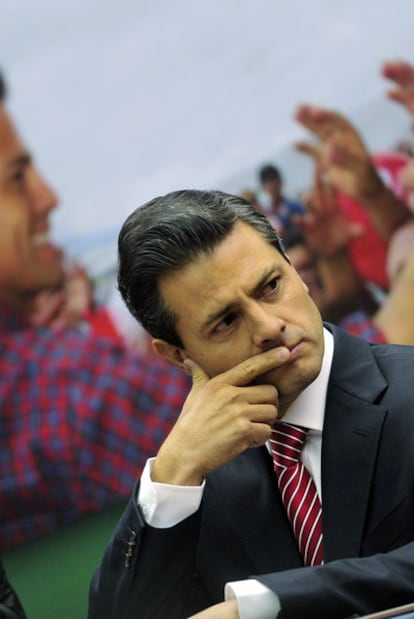"The PRI has learned from its errors"
PROFILE: Mexican presidential candidate Enrique Peña Nieto
Enrique Peña Nieto has spent his whole life preparing to become president of Mexico, and poll after poll shows that he may just well emerge triumphant in next year's election and sweep the Institutional Revolutionary Party (PRI) back into power after 12 years on the sidelines.
But the 45-year-old former governor of Mexico State knows that he still has to convince many younger voters that the PRI, which held an iron grip on power in Mexico for nearly 70 years, is a different party.
"In many aspects, today's PRI is made up by new generations who have grown up in a democratic environment and culture," says Peña Nieto. "The main thing is that [the PRI] is prepared to compete democratically."
Hampered by low economic growth, which is compounded by a devastating internal war on the drug cartels that has cost some 10,000 lives in the past five years, Mexico has grown frustrated with President Felipe Calderón's conservative National Action Party (PAN). Recent polls put Peña Nieto ahead by 20 points over his major rivals from the PAN and the leftwing contender Andrés Manuel López Obrador of Democratic Revolution Party (PRD) for the July 1 faceoff.
Peña Nieto took over the reins of the PRI after the influential Senator Manlio Fabio Beltrones abandoned the presidential race and the resignation of party president Humberto Moreira, who was caught up in a financial scandal during his term as governor of Coahuila state. The PRI leader spoke to EL PAÍS just days before his much publicized lapse that occurred during Guadalajara's International Book Fair. Peña Nieto, when asked, failed to name three authors or three books that had had a major impact on his life.
Peña Nieto seems to recognize his limitations, which is one of his stronger points. EL PAÍS asked him about the prices of basic items - some he knew, some he didn't. But he failed significantly when asked about Mexico's minimum wage, which he put at 900 pesos a month, when actually it is about 1,740 pesos ($125). His critics say that Peña Nieto cannot speak without a script, while also accusing him of trying to make peace with the drug cartels by entering into pacts with them.
"There is no basis to that last observation," he says. "That to me is a campaign that is being launched by the opposition to discredit the party. The PRI has already accepted that it has an unfailing obligation to battle organized crime. The PRI is not a party that enters into pacts; that doesn't make any sense. What the PRI is doing is discussing the best strategies to undertake in the fight against organized crime and to ensure public safety."
The PRI has, nonetheless, entered into a controversial coalition with the National Alliance Party, thrusting the unpopular head of the powerful teachers' union, Elba Esther Gordillo, who has long been accused of self-enrichment and stifling Mexico's educational system with the union's policies, to a virtual running-mate position. Gordillo, who has been head of the union for 22 years, oversees an organization of some 1.5 million educational workers, which is crucial to the PRI vote.
"The PRI entered into a partnership with a party not a person," he said. "It isn't the first time the PRI has done this. In fact, it shows that the PRI is not overly confident, that it is not an arrogant party. The PRI is not confident, but it is confident in its strength and in knowing that the solutions are contained in its national platform, knowing that it has learned from its past mistakes, and in knowing that it is ready to enter into a commitment with citizens."
Peña Nieto's "three obsessions" are generating employment through economic growth, reducing poverty, and public safety. He says that legalizing drugs - an idea pushed by former President Vicente Fox - is not a solution to stop trafficking. "I think that the debate over legalization stems from the impatience and suffering by society, which has led to talk for quick solutions."

Tu suscripción se está usando en otro dispositivo
¿Quieres añadir otro usuario a tu suscripción?
Si continúas leyendo en este dispositivo, no se podrá leer en el otro.
FlechaTu suscripción se está usando en otro dispositivo y solo puedes acceder a EL PAÍS desde un dispositivo a la vez.
Si quieres compartir tu cuenta, cambia tu suscripción a la modalidad Premium, así podrás añadir otro usuario. Cada uno accederá con su propia cuenta de email, lo que os permitirá personalizar vuestra experiencia en EL PAÍS.
¿Tienes una suscripción de empresa? Accede aquí para contratar más cuentas.
En el caso de no saber quién está usando tu cuenta, te recomendamos cambiar tu contraseña aquí.
Si decides continuar compartiendo tu cuenta, este mensaje se mostrará en tu dispositivo y en el de la otra persona que está usando tu cuenta de forma indefinida, afectando a tu experiencia de lectura. Puedes consultar aquí los términos y condiciones de la suscripción digital.








































